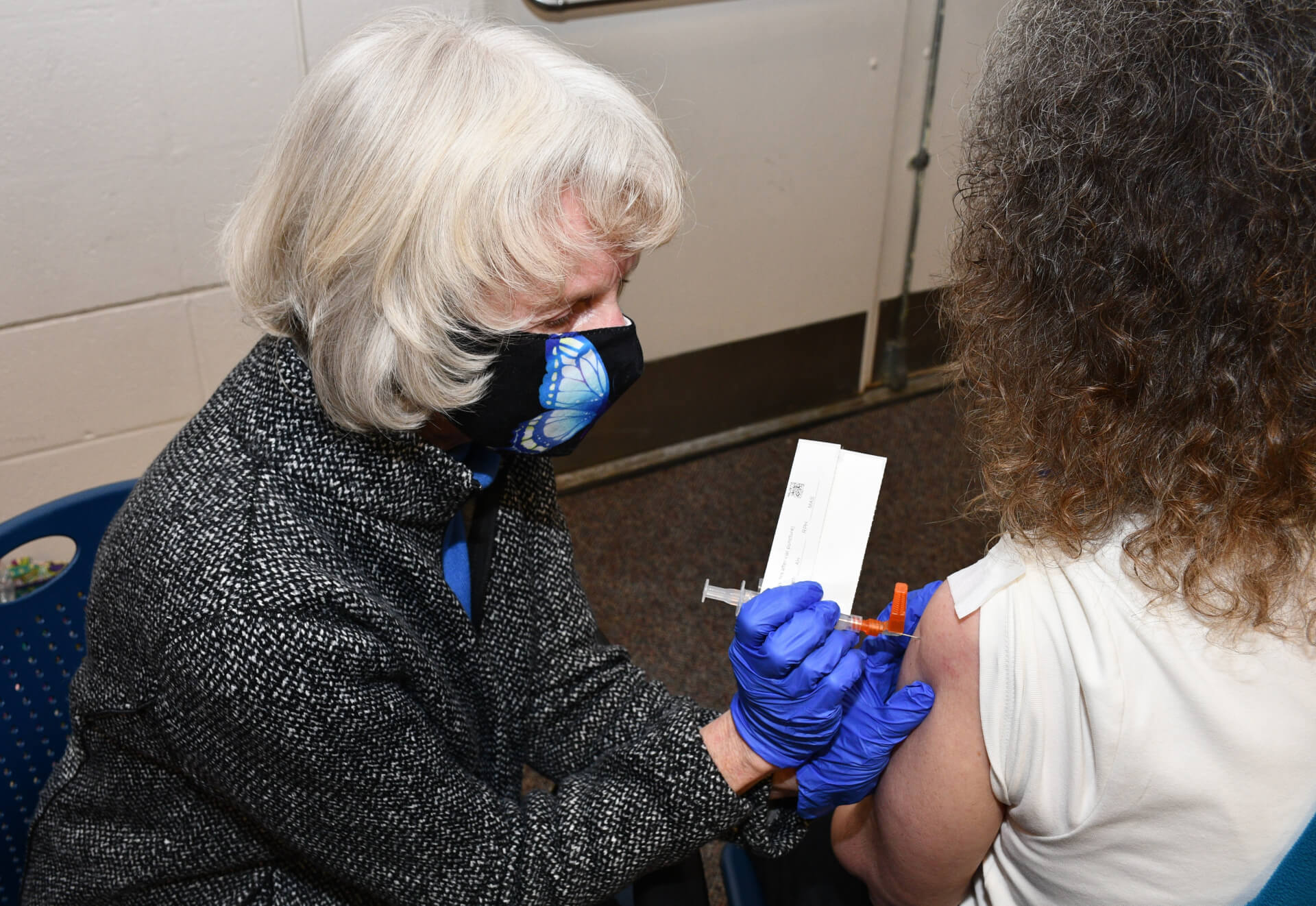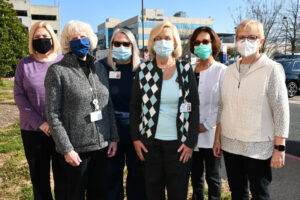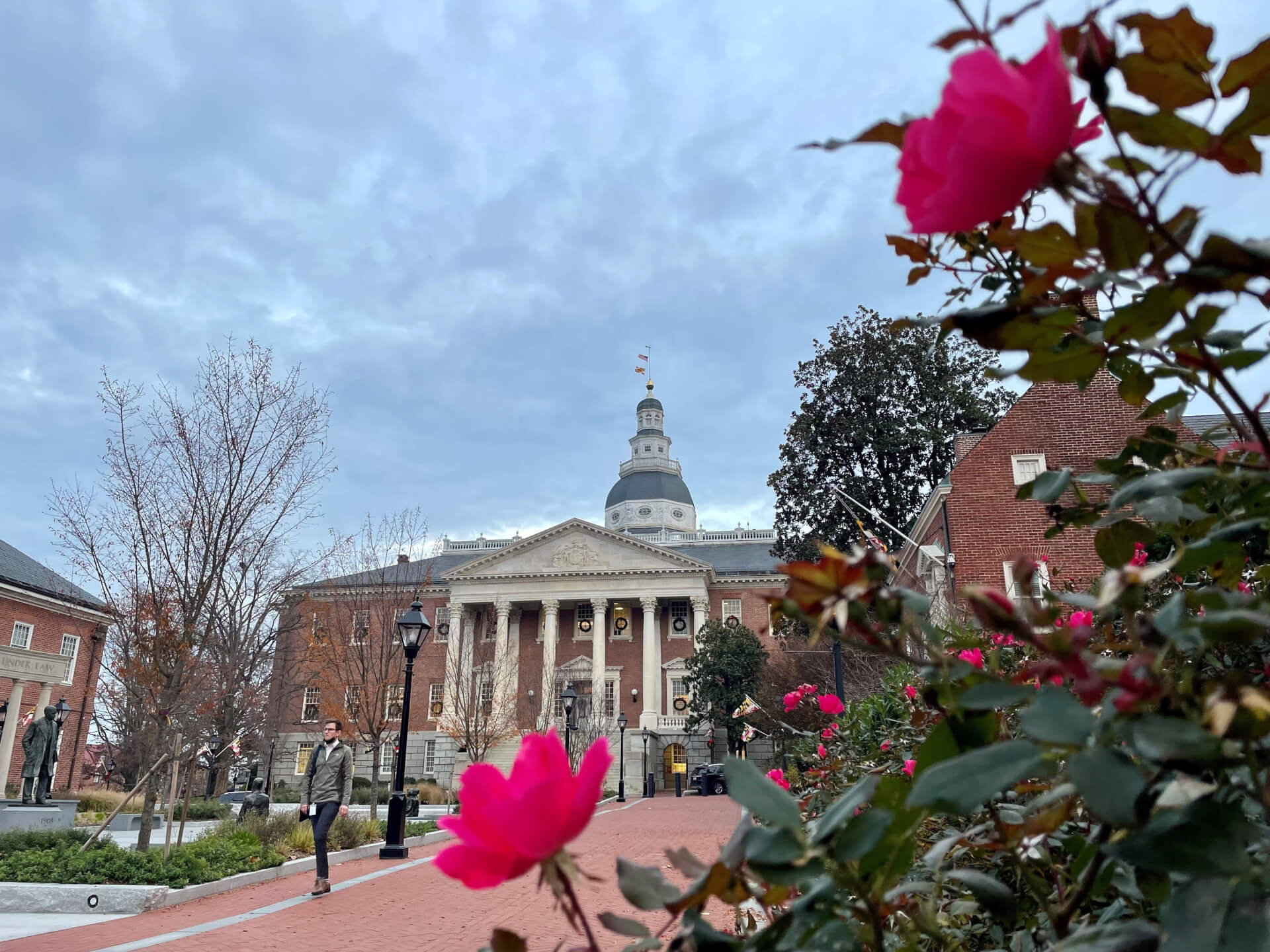Retirees in Medical Reserve Corps Help Vaccine Effort, Despite ‘Red Tape’

When officials at TidalHealth Peninsula Regional, the large health center in Salisbury, put out the call for recently-retired nurses to come back and help get their COVID-19 vaccination program off the ground, they suspected they would get a good response.
And they did.
Six nurses who had worked a combined 241 years immediately stepped forwarded to volunteer their time, administering vaccinations in five-hour shifts multiple days a week.
The six women are among hundreds of Maryland medical personnel who have returned to the trenches in some fashion since the pandemic began.
Some are working for pay. Others donate their time. And some health care professionals say the state’s portal proves to be a barrier for would-be volunteers.
When Diane Smith, one of the six nurses at TidalHealth, heard about the opportunity, she “knew right away” she wanted to be involved.
Even though she had worked for more than 40 years, Smith — who thought she had retired for good in 2017 — signed up.
“I felt like I needed to give back to the community, and this was a wonderful way to do it,” she said. “And, I missed working. I really did. So it was good to get back into the saddle again.”

Peggy Wright, Diane Smith, Connie Spencer, Sharon Malone, Darlene Morcom and Janet Mercer (identified from left to right) all spent their careers at TidalHealth Peninsula Regional, and all retired in the past few years after 39 to 45 years of service. The nurses came out of retirement to help the health system with COVID-19 vaccine clinics. TidalHealth photo.
A Facebook post honoring the women for their service was viewed more than 30,000 times, said Roger Follebout Jr., head of strategic communications at TidalHealth.
Vaccine recipients have been particularly thankful.
“The people getting the shots are so appreciative and grateful, and have tears in their eyes,” said nurse Sharon Malone. “I feel like I made the right decision.”
The returning nurses had a monthly group breakfast before the pandemic hit. They say the sooner the pandemic is over, the sooner they can get back to enjoying retirement.
“These last ten months have been cramping our style!” said Darlene Morcom, a former nursing supervisor. “We like to be out and be social.”
Because they’ve been able to tap their network of retirees, TidalHealth has been able to keep its paid workforce focused on patient care, said Follebout. “The beauty of having these nurses back is it allows our frontline nurses — the nurses who are full-time and have been providing patient care — to continue doing that, while we can still vaccinate the public.”
According to the Maryland Department of Health, 1,897 physicians and 4,252 nurses have signed up for the “Maryland Responds Medical Reserve Corps.”
Nearly 5,300 non-medical volunteers have signed up as well. That group performs data entry, staffs vaccine call centers, and helps in warehouses and with other tasks.
The Biden administration announced a move Wednesday to bolster the number of people who can administer COVID-19 vaccines by making it easier for retired doctors and nurses to give those shots.
The federal government also will allow current doctors and nurses to administer vaccines in states other than where they are licensed. The Health and Human Services Department will make those changes through a declaration under the Public Readiness and Preparedness Act, which provides immunity from liability under emergency circumstances.
A pandemic expert, sitting home
Lisa V. Stone spent her career preparing for a pandemic like COVID-19.
But last winter the Boston transplant, a recent retiree, found herself sitting home in Talbot County, watching the news out of Wuhan, China, and fielding nervous inquiries from relatives and friends.
Some former colleagues also wanted her take on the situation.
The former head of pandemic preparedness response for the Commonwealth of Massachusetts, Stone moved to Maryland to be near her sister and to enjoy the milder climate.
She began by sending daily emails to the people in her circle who were asking, “Is this the pandemic?” but she still felt under-utilized.
“When the pandemic emerged, I was sitting here, on the Eastern Shore, a pandemic response expert, without a role,” she said. “So, one day I just printed out my [curriculum vitae] and dropped it off at the local health department, the local hospital and the local emergency operations center.”
All three responded the same day, and soon Stone was back at work.
She was appointed to the COVID-19 Task Force of Shore Regional Health, part of the University of Maryland Medical System, she helped coordinate the staffing of a local coronavirus testing site and she did contact tracing for the local health department.
Now she is volunteer coordinator for a vaccination program.
“I knew that my experience was fairly unique in that I had literally spent 15 years focusing on pandemic preparedness, so I felt like I had something to offer, but I didn’t have a way to offer it,” she said.
“The hardest time for me was sitting home, watching it happen, and not doing anything about it. That was really hard.”
‘Red tape’ makes signing-up difficult
Dr. Michael Fisher serves alongside Stone on the COVID-19 task force. The pair shared “Volunteer of the Year” honors in 2020 for their efforts, with Fisher receiving his award from Gov. Lawrence J. Hogan Jr. (R) at a State House ceremony.
A recently-retired gastroenterologist, Fisher and his wife, a retired nurse practitioner, have wanted to help patients and institutions battle the pandemic, but both have found the “red tape” difficult.
“I’ve had a number of colleagues who’ve wanted to come back and help with the vaccination effort, but the red tape is incredible,” he said.
Karen Fisher did contact tracing work for the Talbot County Health Department, which she found “very interesting, very gratifying. Something I’d never done before.”
She would like to do more but has found “there’s definitely an issue” with the Maryland Responds sign-up portal.
“I’ve been trying to volunteer to give the vaccines — and I’ve never worked so hard in my life to be a volunteer,” she said last week. “I’ve tried to sign-on to do the training four or five times. The website crashed. I’ve filled out all this paperwork for the hospital and they haven’t called. It’s just very interesting.”
On Wednesday, both Michael and Karen Fisher got word they have been accepted to administer vaccines at UMMS/Shore Regional Health.
Michael Fisher said he would like to speak with Hogan about ways of smoothing out the system.
“I’d love to sit down and help him solve some of these problems, because I have the time,” he said. “There’s many more people who are willing to help, but they can’t because of the system.”
Laura Olson of States Newsroom contributed to this report.




 Creative Commons Attribution
Creative Commons Attribution